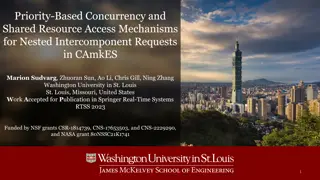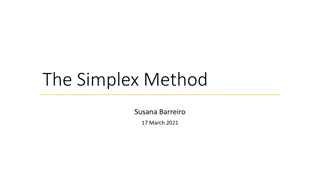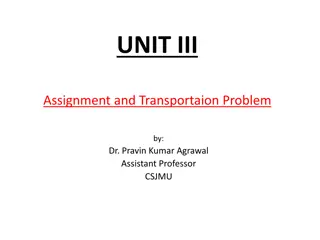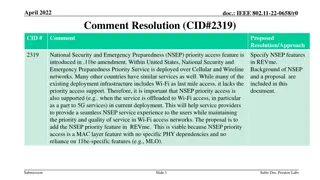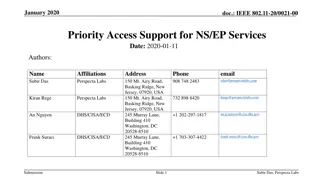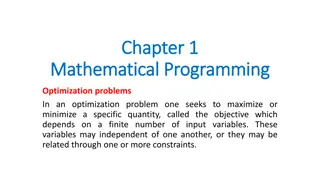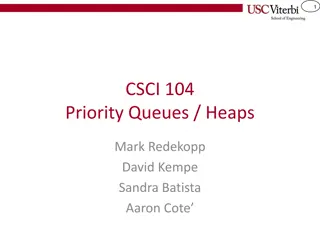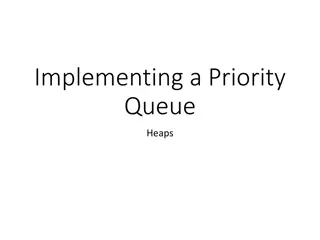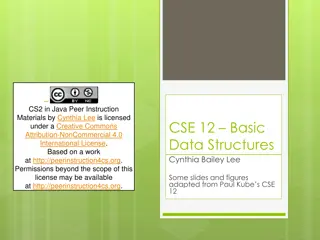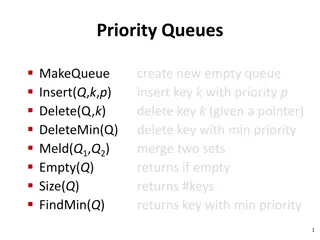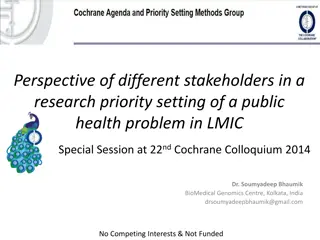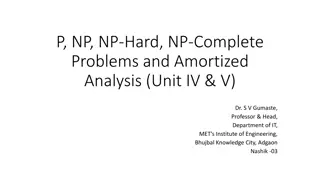Understanding the Formulation of Hypothesis and Research Problem Definition
Research problems arise from situations requiring solutions, faced by individuals, groups, organizations, or society. Researchers define research problems through questions or issues they aim to answer or solve. Various sources such as intuitions, research studies, brainstorming sessions, and consul
5 views • 25 slides
A Concurrency Framework for Priority-Aware Intercomponent Requests in CAmkES on seL4
This research work proposes a concurrency framework designed to handle priority-based intercomponent requests efficiently in CAmkES on seL4. The framework supports reentrant execution, locked critical sections over shared state using IPCP, NPCS, and PIP protocols. It requires minimal changes to comp
0 views • 8 slides
Priority Activities and Action Plan for EW4All Infrastructure Commission: INFCOM-3 Session
The document outlines the priority activities and action plan for the Third Session of the Infrastructure Commission (INFCOM-3) within the Early Warnings for All initiative. It includes background decisions, a draft list of priority activities, and an action plan for contributions to the initiative.
5 views • 10 slides
Understanding The Simplex Method for Linear Programming
The simplex method is an algebraic procedure used to solve linear programming problems by maximizing or minimizing an objective function subject to certain constraints. This method is essential for dealing with real-life problems involving multiple variables and finding optimal solutions. The proces
0 views • 56 slides
Linear Programming Models for Product-Mix Problems and LP Problem Solutions
This unit covers the formulation of linear programming (LP) models for product-mix problems, including graphical and simplex methods for solving LP problems along with the concept of duality. It also delves into transportation problems, offering insights into LP problem resolution techniques.
0 views • 137 slides
Learning Objectives in Mathematics Education
The learning objectives in this mathematics course include identifying key words, translating sentences into mathematical equations, and developing problem-solving strategies. Students will solve word problems involving relationships between numbers, geometric problems with perimeter, percentage and
0 views • 30 slides
Proposal to Add National Security and Emergency Preparedness Priority Access Feature in IEEE 802.11be Amendment
The document proposes integrating the National Security and Emergency Preparedness (NSEP) priority access feature into the IEEE 802.11be standard to ensure seamless NSEP service experience, particularly in Wi-Fi networks used as last-mile access. The NSEP priority feature at the MAC layer is indepen
0 views • 12 slides
Effective Intervention Planning for Rehabilitation Services
The intervention in the DEA programme involves a thorough assessment of user needs, formulation of objectives, and planning based on case management technology. The cycle includes assessment, planning, and actual intervention. Prioritizing high-priority problems is essential for effective outcomes.
1 views • 13 slides
IEEE 802.11-20/0021-00 Priority Access Support for NS/EP Services Overview
This document discusses the importance of priority access support in IEEE 802.11be for National Security and Emergency Preparedness (NS/EP) services. It outlines the need for standardized mechanisms to ensure priority services in WLAN networks during NS/EP events when cellular coverage is unavailabl
1 views • 15 slides
Introduction to Mathematical Programming and Optimization Problems
In optimization problems, one aims to maximize or minimize an objective based on input variables subject to constraints. This involves mathematical programming where functions and relationships define the objective and constraints. Linear, integer, and quadratic programs represent different types of
0 views • 25 slides
Examples of Optimization Problems Solved Using LINGO Software
This content provides examples of optimization problems solved using LINGO software. It includes problems such as job assignments to machines, finding optimal solutions, and solving knapsack problems. Detailed models, constraints, and solutions are illustrated with images. Optimization techniques an
1 views • 41 slides
Formulation of Linear Programming Problems in Decision Making
Linear Programming is a mathematical technique used to optimize resource allocation and achieve specific objectives in decision-making. The nature of Linear Programming problems includes product-mix and blending problems, with components like decision variables and constraints. Various terminologies
1 views • 14 slides
Understanding Priority Queues and Heaps in Java Collections
Explore the concepts of priority queues, heaps, and related data structures in Java Collections Framework. Learn about the Priority Queue class, Entry ADT, Comparator ADT, and Total Order Relations, along with their practical applications in process scheduling and more.
0 views • 44 slides
Understanding Heaps and Priority Queues in Data Structures
Exploring the concepts of heaps, priority queues, and the Priority Queue ADT in the context of data structures. Topics include the implementation of priority queues, comparing different data structures for efficiency, and the behavior of operations like insert and removeMin.
0 views • 40 slides
Understanding Priority Queues and Heaps in Java
Explore the concepts of priority queues, heaps, and their implementations in Java. Learn about efficiency tradeoffs, interface vs. implementation, and the primary operations of priority queues. Discover the importance of comparable elements and the various data structures used for efficient operatio
0 views • 49 slides
Understanding Priority Queues and Heaps in Data Structures
Priority queues prioritize item retrieval based on value, contrasting with traditional queues that follow a first-in-first-out approach. Priority queues efficiently manage items based on their importance, often utilized in scenarios like emergency rooms or air traffic control. Heaps, a form of binar
0 views • 20 slides
Understanding Priority Queues and Heaps
Priority queues differ from regular queues by maintaining an ordering of items based on priority rather than first-in-first-out. Items in a priority queue are assigned priority values and the highest priority item is removed first. Different data structures can be used to efficiently insert and remo
0 views • 54 slides
Understanding Priority Queues and Heaps in Data Structures
Priority Queues are data structures that support operations like Enqueue, Dequeue, Insert, and deleteMin, where elements are ordered based on priority. This article covers various aspects of Priority Queues, including their implementation, applications in operating systems, and the concept of Binary
0 views • 25 slides
Understanding Binary Heaps: Efficient Data Structure for Priority Queue Operations
Explore the concept of binary heaps, a specialized type of binary tree that allows for quick retrieval of the smallest (or largest) element. Learn how binary heaps excel in finding the minimum value, essential for priority queue applications in operating systems, event simulations, and more. Compare
2 views • 34 slides
Implementing a Priority Queue with Heaps
Learn about implementing a priority queue using heaps. Priority queues are essential data structures that maintain a special ordering property. The use of binary trees and heaps is explained in detail, focusing on maintaining shape and heap properties during insertions.
0 views • 57 slides
Understanding Priority Queues and Heap Data Structures
Priority queues play a key role in computer science algorithms by managing data based on priority levels. The use of heap data structures enhances the efficiency of priority queue operations. This tutorial covers the basics of priority queues, their applications, different implementations such as li
0 views • 30 slides
Priority Queues in Java: Implementation and Use Cases
Explore the concept of priority queues in Java, covering implementations using unsorted and sorted linked lists, as well as heaps. Learn about the differences between a queue and a priority queue through reading quizzes and discover various priority queue implementation options. Dive into priority q
1 views • 42 slides
Engaging Mathematics Problems for Critical Thinking and Fun Learning
Explore a collection of engaging mathematics problems and classical brain teasers that challenge students to think critically, problem-solve creatively, and have fun while learning. From dissection tasks to card dealing challenges, these problems encourage students to readjust, reformulate, and exte
0 views • 36 slides
Algorithm Design Techniques: Divide and Conquer
Algorithm design techniques such as divide and conquer, dynamic programming, and greedy algorithms are essential for solving complex problems by breaking them down into smaller sub-problems and combining their solutions. Divide and conquer involves breaking a problem into unrelated sub-problems, sol
1 views • 13 slides
Understanding and Treating Sleep Problems in Children with Autism
Sleep problems in children with autism are viewed as skill deficits that can be addressed through relevant skills teaching. Good sleep is crucial for children's overall well-being, as it affects mood, behavior, learning, and physical health. Lack of good sleep can lead to irritability, fatigue, unin
0 views • 75 slides
Priority Queues: Operations and Implementations
Priority queues are data structures that allow efficient insertion, deletion, and retrieval of elements based on their priority. This information-rich content covers various aspects of priority queues, including ideal times, binomial queues, Dijkstra's algorithm for single-source shortest paths, and
0 views • 11 slides
Understanding Priority Queues and Heaps in CS2110
Delve into the realm of priority queues and heaps in the context of CS2110 during the Fall of 2015. Explore the differences between heaps and Binary Search Trees (BSTs) through desirable properties and advantages each structure offers. Discover how stacks and queues are implemented as restricted lis
1 views • 50 slides
Understanding Priority Queues and Heaps in Data Structures
Exploring the concepts of priority queues, heaps, and various data structures like linked lists, binary search trees, and interfaces like Bag. The content covers comparisons between BSTs and heaps, efficiency purposes in data structures, and implementations of stacks and queues. Learn about the sign
0 views • 50 slides
Understanding Priority Queues and Heaps in CSE 373 Lecture
Today's lecture in CSE 373 covers the Priority Queue Abstract Data Type (ADT), the properties of heaps, and their implementations. Key topics include the completeness property of heaps, different priority queue implementations such as the binary search tree for faster insert and find operations, and
0 views • 21 slides
Priority Setting in Healthcare in Chile: Social Value Judgements and Health Programmes
The presentation discusses the context of priority setting in healthcare in Chile, focusing on social value judgements and the principles of national health programmes with universal coverage. It highlights key statistics about Chile's healthcare system, including population, GDP per capita, and hea
0 views • 20 slides
Understanding Signatures, Commitments, and Zero-Knowledge in Lattice Problems
Explore the intricacies of lattice problems such as Learning With Errors (LWE) and Short Integer Solution (SIS), and their relation to the Knapsack Problem. Delve into the hardness of these problems and their applications in building secure cryptographic schemes based on polynomial rings and lattice
0 views • 44 slides
Understanding Priority Matrix in Teams
Priority Matrix is a valuable tool in the A/C/E industry, allowing teams to prioritize tasks efficiently, communicate priorities effectively, and track progress accurately. Real teams benefit from its use cases in prioritization, communication, and progress tracking, creating a roadmap for workflow
0 views • 23 slides
DHHS Coordination of Transportation Service Contracts Overview
The Department of Health and Human Services in Maine conducted an assessment of Transportation Services in June 2019. The workgroup identified three main priorities: alignment of Quality and Performance Measures, Safety Measures, and Evaluation of Transportation Services. The first priority involves
0 views • 28 slides
Stakeholder Perspectives on Research Priority Setting for Public Health in LMICs
Stakeholders in a special session at the 22nd Cochrane Colloquium 2014 discussed the importance of involving diverse stakeholders in research priority setting for public health issues in Low- and Middle-Income Countries (LMICs). Key topics included barriers to patient involvement, challenges in addr
0 views • 13 slides
Proposals for Prioritizing Bids and Managing Collateral Requirements in Auctions
Market Participants face significant collateral requirements in auctions due to multiple bidding zone borders. Proposal to assign priority to bids for credit limit reasons aims to address randomness in bid rejection. Bid XSD is extended to include priority as a component, enhancing bid management ef
0 views • 6 slides
Theory of Computation: Decidability and Encoding in CSE 105 Class
Explore the concepts of decidability, encoding, and computational problems in CSE 105 Theory of Computation class. Learn about decision problems, encodings for Turing Machines, framing problems as languages of strings, and examples of computational problems and their encodings. Gain insights into th
0 views • 26 slides
Overview of Fall Semester 2019 HPC Current Report
The Fall Semester 2019 HPC Current Report highlights changes made in resource allocation, job queue management, utilization analysis, and factors influencing job priority. Key modifications include adjusting memory per CPU, implementing limit enforcement, and changing fairshare weights. The report d
0 views • 20 slides
Insights into NP-Hard Problems in Molecular Biology and Genetics
Understanding the complexity of NP-Hard Problems arising in molecular biology and genetics is crucial. These problems involve genome sequencing, global alignment of multiple genomes, identifying relations through genome comparison, discovering dysregulated pathways in human diseases, and finding spe
0 views • 24 slides
Understanding P, NP, NP-Hard, NP-Complete Problems and Amortized Analysis
This comprehensive study covers P, NP, NP-Hard, NP-Complete Problems, and Amortized Analysis, including examples and concepts like Reduction, Vertex Cover, Max-Clique, 3-SAT, and Hamiltonian Cycle. It delves into Polynomial versus Non-Polynomial problems, outlining the difficulties and unsolvability
0 views • 32 slides
Suicide Prevention Advisory Group Monthly Meeting Summary
The Suicide Prevention Advisory Group held their monthly meeting discussing collaboration with SMEs, funding priorities, consensus panel timeframe, portfolio reorganization in ISRM, AMP development, survey data review, and priority setting process. They also reviewed initial results from the SP Prio
0 views • 39 slides

